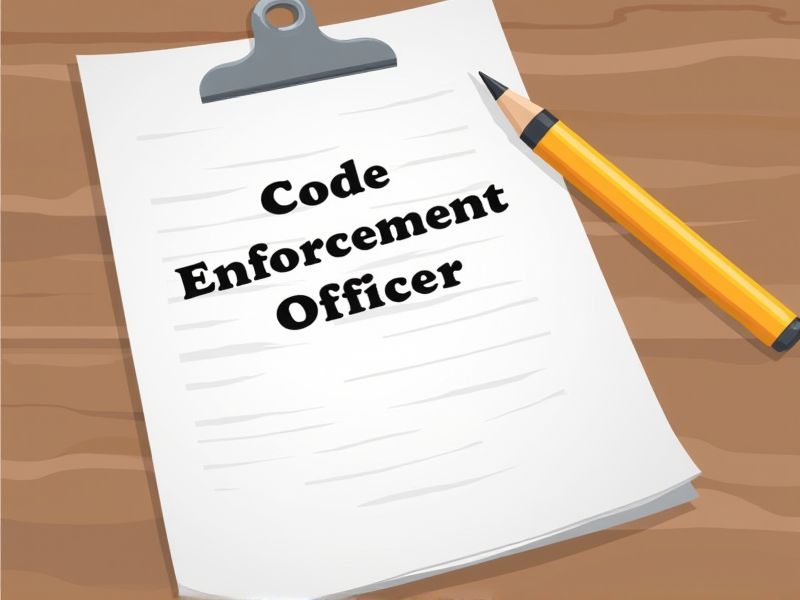
Code Enforcement Officers ensure community safety by enforcing local rules and building codes. Certifications offer them in-depth knowledge of laws, building standards, and safety protocols, essential for making informed decisions. These credentials also validate their expertise and enhance public trust in their judgment during inspections. Below are key certifications that may be required for a Code Enforcement Officer.
International Code Council (ICC) Building Official Certification
Obtaining the ICC Building Official Certification ensures a Code Enforcement Officer possesses a standardized understanding of building codes, enhancing the consistency of code application across jurisdictions. This certification demonstrates the officer's proficiency and commitment to upholding public safety standards, which fosters community trust. It provides a structured framework for officers to stay current with evolving regulations and construction practices. The credential bolsters career advancement opportunities by validating professional expertise and competence in the field.
International Code Council (ICC) Residential Inspector Certification
The International Code Council (ICC) Residential Inspector Certification ensures that Code Enforcement Officers have a comprehensive understanding of building codes and standards, which is crucial for maintaining the safety and integrity of residential structures. This certification enhances credibility and professionalism, as it signifies that an inspector is well-versed in current construction practices and regulations. It equips officers with the skills necessary to identify potential hazards and enforce compliance, thereby reducing the risk of structural failures or unsafe living conditions. Increased competency from certification also improves community trust in the enforcement process, fostering an environment of safety and accountability.
International Fire Code (IFC) Inspector Certification
Certifying Code Enforcement Officers as International Fire Code Inspectors ensures they possess the comprehensive knowledge required for assessing and enforcing fire safety standards effectively. This certification verifies proficiency in identifying fire hazards and implementing necessary prevention measures, which can reduce the risk of fire-related incidents. Certification enhances uniformity and credibility in code enforcement practices across different jurisdictions, facilitating consistent fire safety measures worldwide. Having certified professionals can lead to improved trust within the community, as citizens are more likely to adhere to codes enforced by recognized experts.
International Plumbing Code (IPC) Inspector Certification
The IPC Inspector Certification ensures that a Code Enforcement Officer possesses a comprehensive understanding of standardized plumbing regulations, which is critical for consistent enforcement of plumbing codes. This certification aids in maintaining public health and safety by verifying that plumbing installations comply with necessary standards. It enhances the officer's ability to identify non-compliance issues effectively, reducing potential risks associated with faulty plumbing. It demonstrates a commitment to ongoing professional development, increasing the trust and credibility of the enforcement officer in the community.
National Fire Protection Association (NFPA) Certification
National Fire Protection Association (NFPA) Certification ensures a Code Enforcement Officer has comprehensive knowledge of fire safety standards and regulations. This certification enhances their ability to properly inspect and enforce codes, reducing risks of fire hazards in buildings. Certification also promotes uniformity in enforcement practices, ensuring consistent safety measures across different jurisdictions. Employers and communities often require this certification to verify the officer's competence and commitment to safety.
OSHA 30-Hour Safety Certification
The OSHA 30-Hour Safety Certification is needed for Code Enforcement Officers to enhance their understanding of workplace hazards, increasing their capability to identify potential safety violations. Acquiring this certification ensures they can effectively enforce safety regulations, thereby reducing workplace accidents and injuries. Knowledge from the certification allows officers to educate property owners and occupants on compliance requirements, fostering a safer community. Officers with this certification demonstrate a commitment to maintaining consistent safety standards, positively impacting public welfare.
Asbestos Inspector Certification
Asbestos poses significant health risks such as lung cancer and mesothelioma, so a Code Enforcement Officer needs certification to identify and manage asbestos materials safely. The certification ensures that the officer can assess and direct potential remediation efforts correctly, reducing public health hazards. With proper training, inspectors can help enforce environmental regulations designed to prevent asbestos exposure. Certified officers contribute to more accurate and efficient building inspections, aligning with safety standards and legal requirements.
Lead-Based Paint Inspector Certification
Exposure to lead-based paint poses significant health risks, especially to children, making it crucial for Code Enforcement Officers to identify and mitigate such hazards. The certification ensures officers understand how to properly assess and handle lead materials during inspections. Without proper certification, officers might overlook lead hazards, leading to potential public health issues. Ensuring that Code Enforcement Officers are certified helps prevent legal liabilities and promotes safer living environments.
ADA Compliance Certification
ADA Compliance Certification equips Code Enforcement Officers to ensure that public and private buildings meet accessibility standards, directly influencing the safety and accessibility of these structures for individuals with disabilities. This certification provides critical knowledge on the legal and technical requirements set by the Americans with Disabilities Act, aiding officers in identifying and rectifying non-compliant elements. Obtaining the certification reduces the risk of lawsuits and penalties for municipalities by ensuring that all structures are inspected and approved according to federal guidelines. It enhances public trust and demonstrates the commitment of local governments to uphold inclusivity and equality across communities.
Zoning and Land Use Regulatory Certification
Zoning and Land Use Regulatory Certification equips code enforcement officers with necessary knowledge of local laws governing land usage, which ensures compliance and mitigates legal conflicts. Proper certification allows officers to effectively evaluate development proposals against established zoning regulations. This training supports the balanced growth of communities by promoting orderly development and land conservation. Certification reinforces the authority of enforcement officers, empowering them to apply regulations consistently and fairly.
Summary
When you, as a Code Enforcement Officer, obtain additional certifications, you enhance your professional credibility. This can lead to more effective enforcement of regulations due to improved knowledge and skills. Professional development through certifications often results in increased job opportunities and career advancement. Your community benefits from higher standards of safety and compliance, fostering trust in regulatory systems.
